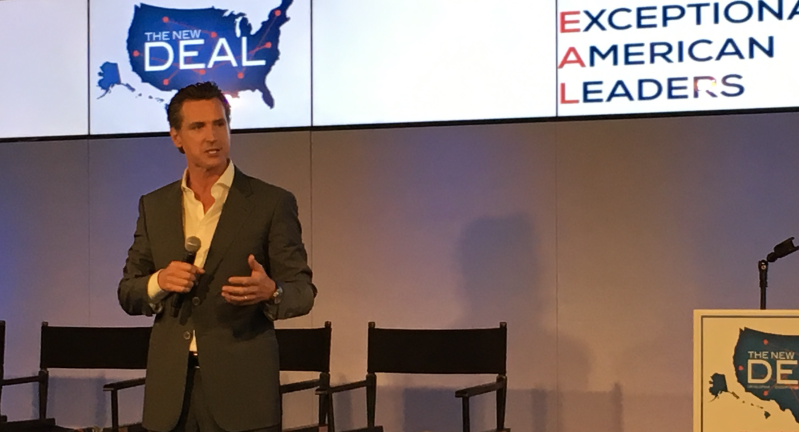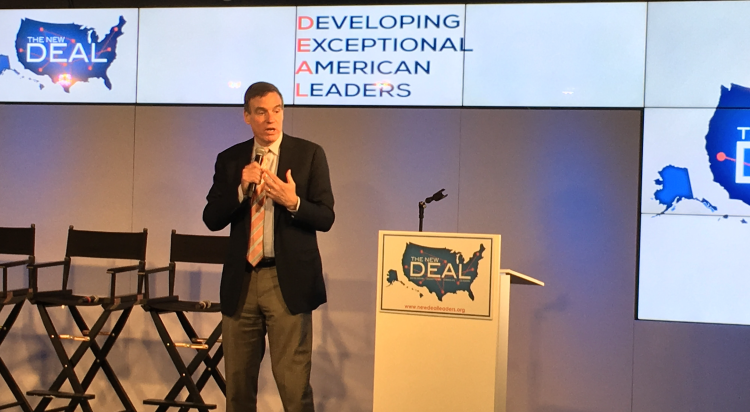“This is the issue of our time,” declared U.S. Senator Mark Warner (D–VA), describing the challenges posed by technological innovation and job losses. “There are wide, wide swaths of our country that aren’t doing well. Economic insecurity is not going away.”
At the New Deal Ideas Summit held today in San Francisco, Sen. Warner addressed a group of pro-growth, progressive politicians and business leaders. He denounced two popular approaches to the nation’s economic anxieties: First, one championed by President Donald Trump calls for a return to an apocryphal, halcyon time, while the second, favored by many progressive Democrats, calls for a 1930s-style redistribution of wealth. “The two solutions don’t meet the bill,” he said.
California Lieutenant Governor Gavin Newsom also seeks a new approach. “We’re in a proverbial hinge moment, both technological and economic. It’s a precarious moment filled with fear and anxiety.” He presented the disparity within the Golden State as a microcosm of America. “Across the nation and here in California, we’re living in two different economies. For instance, take Imperial County and it has 19 percent unemployment versus the 2.7 percent in San Francisco,” Newsom said.

Above: Lieutenant Governor Gavin Newsom onstage at The New Deal Ideas Summit on May 30, 2017.
As job losses caused by automation — both actual and feared — mount, the sharing economy is sometimes held up as a way to blunt the economic trauma.
June 5th: The AI Audit in NYC
Join us next week in NYC to engage with top executive leaders, delving into strategies for auditing AI models to ensure fairness, optimal performance, and ethical compliance across diverse organizations. Secure your attendance for this exclusive invite-only event.
Sen. Warner was skeptical that a job at the likes of Uber or TaskRabbit could offer meaningful relief without a more adequate safety net with social benefits. “The gig economy, it’s cool, it’s hot, it’s the hip area, but it’s still a small portion of our workforce,” he said, drawing a distinction between sharing economy jobs and the tendency of companies to hire part-time or temporary workers. “What’s not small, however, is that 35 percent of the workforce — or 10 million people — are temp or contractors.”
But rather than force legislation to remedy employee classifications, Sen. Warner stated that government needs to embrace these changes head-on and work to re-engineer the social safety net.
The senator also said that large Silicon Valley companies like Google and Apple have an obligation to create real, new jobs in the American heartland: “We always thought that one of the benefits of the information age was that you can build it anywhere, like in Singapore or Mumbai, but can you also build it say, in rural Virginia or rural California?”
Sen. Warner described success in bringing tech jobs to a former coal mining town in Western Virginia but admits, “We haven’t yet figured out how to do that at scale.”
One solution, he suggested, might involve incentivizing Apple and other companies to repatriate overseas capital and profits. “Maybe part of their supply chain needs to be located in disadvantaged areas” in the U.S., he said.
In addressing the potential role of large tech companies, Sen. Warner said that he would be meeting with several of them this week while in California. “My hope would be that the leaders in the tech community — we can’t legislate that responsibility, but we can encourage it,” Sen. Warner said. “The value-add that they can bring with some supply chain jobs in many of these places across America is far greater, to be frank, than anything government can do.”
Sen. Warner also sees a role for venture capital in helping grow local economies. (Prior to becoming a politician, he founded Columbia Capital.) He said, “We’ve seen a lot of new approaches [in Virginia]. We don’t have a central location like Silicon Valley. We’re trying to make sure we’ve got kind of a statewide capital stack to match by type of business [entrepreneurs] to potential funders. We’re not counting on the Valley firms to come to Virginia. Right now, I’m trying to figure out what other states are doing this well.”
Even while venture capital may help create and nurture entrepreneurship, the role of artificial intelligence in eliminating job losses seems relentless. Lt. Gov. Newsom cited the coming job losses for truck drivers by the likes of Otto, the disappearance of cashier positions by Amazon Go, and even the replacement of shopping mall security guards by robots, which he sees as a stern wake-up call.
“Something big is happening to the plumbing of the world,” Lt. Gov. Newsom said. It’s having “a profound impact on wages and income inequality, and we ain’t seen nothing yet.”

